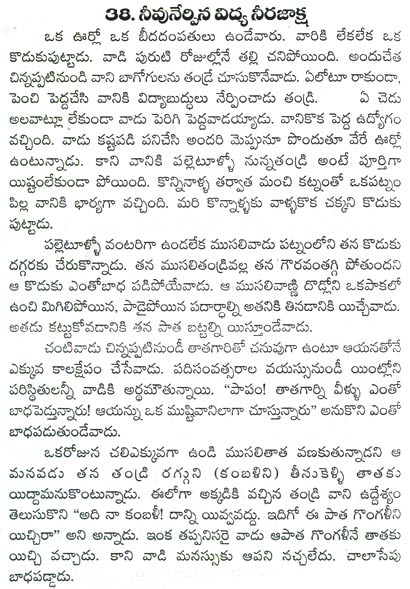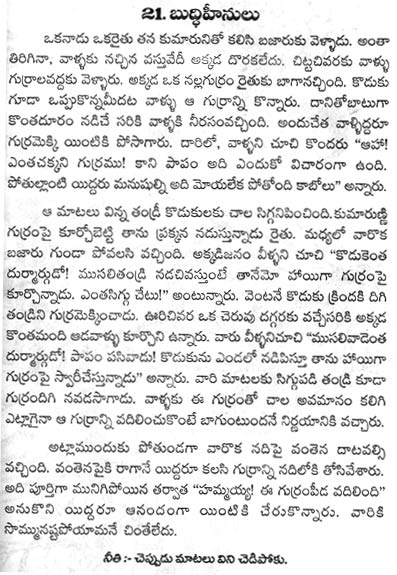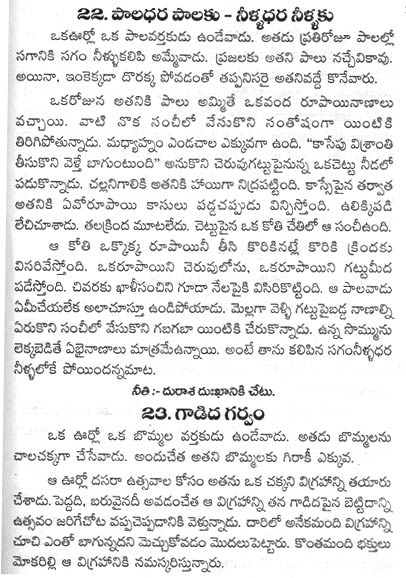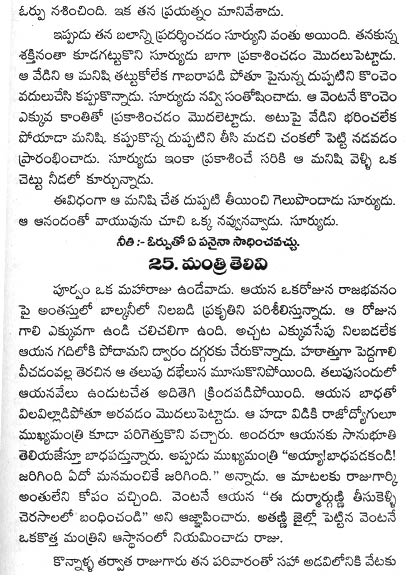The sign of life is a struggle for growth. A tiny seed breaks open the earth to grow into a plant, but growth alone does not add beauty to life, rather wild and abnormal growth sometimes leads to stagnation. Shaping growth through proper training and systematic discipline is the only way to make life beautiful, which ultimately leads to a fully-fledged personality.
In the history of mankind, great personalities appeared who shook the world during their lifetime. Their marvellous achievements dazzled the eyes of people for a while but were forgotten immediately after their demise. The reason was the appearance of greater and stronger personalities with extraordinary brilliance, who made their hold strong on the minds of people. Achievement in life certainly makes a person great but does not add much to his or her personality. The need of the hour is to develop a personality based on character and not on achievements in life. Real Personality, which is based on character, is remembered by the world through eternity. The number of such people, though small, can shape the destiny of mankind. Their names remain imprinted in the hearts of millions of people forever. We are proud to say that in modern times India could produce such a real and universal person in Swami Vivekananda, whose thoughts are a source of inspiration, throughout the world to shape a real personality.
PERSONALITY DEVELOPMENT
There is a deep interest in personality development, especially among the youth. They are in a hurry and expect instant change in their personality. In fact, they do not understand the difference between 'change' and 'development'. It is quite possible to change one's personality overnight. Beauty parlours, hairdressing, ready-made garments, cosmetics, and high-heeled shoes can do this magic, which is only a temporary change, and does not help in developing the real personality. It is not advisable to resort to such cheap methods, wasting time, money, and energy.
There are four dimensions of the human personality i.e. Physical, Mental, Intellectual, and Spiritual. A harmonious growth of all these aspects constitutes the real personality. One must strive for sound health, strong mind, pure intellect, and spiritual growth simultaneously.
1. PHYSICAL DIMENSION:
The human body is a rare gift of God. Good health is the source of happiness ar.d success in life. Since the body and mind are closely related to each other, ill health causes mental worries and depression, not enabling to pursue a definite goal in life. Swami Vivekananda has rightly said that most of our miseries are caused by our physical weaknesses.
Our ancient teachers said: 'The body is the means for the pursuit of religion'. Therefore, it is our duty to maintain good health. Swami Vivekananda repeatedly asserted that we must develop muscles of iron and nerves of steel. In one of his lectures, he said: 'Be strong, my young friends, that is my advice to you. You will be nearer to heaven through football than through the study of the Gita. These are my bold words, but I have to say them, for I love you. I know where the shoe pinches. I have gained a little experience. You will understand the Gita better with your biceps, your muscles, a little stronger.' Poor health not only creates tension in the person concerned but also disturbs the whole family. To meet the medical expenses, the whole family has to suffer from financial strain. A healthy person always keeps his mind cool in all circumstances. He performs his duties efficiently, enthusiastically, and cheerfully. The development of physical strength, which is indispensable to serve others, and to protect one's self-interest, should not be abused for destroying national property. Uncontrolled physical energy may times erupt in the form of caste and communal riots, anti-social activities, violence, robbery, harassment, etc., disturbing the peace and harmony in society. One must canalize this physical energy into constructive purposes.
Habits play a vital role in developing physical dimensions. Bad habits, such as drinking, smoking, drug addiction, etc., can do great harm to physical health, making a person weak and susceptible to chronic diseases. One must be very careful and should never fall prey to such harmful habits. Even the company of such people who are the victims of bad habits should be shunned at all costs. The influence of bad company is very harmful to teenagers. Their tender and immature mind can easily succumb to the temptations of bad habits. Therefore, parents and teachers should keep watch over them and motivate them to cultivate good habits. Developing good habits regarding food, sleep, exercise, and work is the secret of good health.
The practice of yogasana and breathing exercises is the most effective method to keep the body fit, but one must practice them under the guidance of a competent teacher.
In ancient India, learning in the Gurukula system, students used to spend their early days in the company of enlightened teachers. By practising strict discipline, such as, brahmacharya, physical austerities, service to guru, study of different branches of knowledge, etc., they would attain tremendous energy within themselves. They were capable of retaining all the Vedas in their memory. The obvious reason is the conservation of sensual and mental energy. Over-indulgence in sensual pleasures makes the senses bereft of vigour and strength, and unfit for higher achievements in life. Though our sages were married, they had tremendous control over their senses. By the practice of brahmacharya. one can easily transform the sexual energy into ojas, which makes the brain and the nervous system strong and brings new vigour and enthusiasm in blood. Single-pointed concentration and memory power are the results of brahmacharya.
Swami Vivekananda has rightly said: 'Do you see. simply by observance of strict brahmacharya (continence) all learning can be mastered in very short time. One has an unfailing memory of what one hears or knows but once. It is owing to this want of continence that everything is on brink of ruin in our country'.
So, nutritious food, regular exercise, cultivating good habits, and self-control help us to improve our health, which forms a part of personality development.
2. MENTAL DIMENSION:
The mind is superior to the body. It is the mind that makes the body, but not vice versa. Mind is a repository of thoughts. Negative and evil thoughts make the mind weak. Weak and uncontrolled mind always succumbs to temptations, creating havoc with a person. The habit of brooding over failures gives rise to negative thoughts. Swami Vivekananda's words will certainly help us to overcome such weaknesses. He said: 'The remedy for weakness is not brooding over weakness, but thinking of strength. Teach men of the strength that is already within them.'
There are a few fortunate souls who are lucky enough to attain success without pitfalls; the rest have to pass through the hurdles and difficulties. But the real hero is he who welcomes challenges in life and faces them with boldness and courage. Such a person crossing all the hurdles comes out successfully like a lion. The following incident took place during Swami Vivekananda's wandering days, when he was staying at Varanasi. It conveys a profound message to the whole world. One day, while returning from the Durga temple, Swamiji was chased by some monkeys. To save himself, Swamiji started running, but the monkeys ran still faster and grew increasingly aggressive. Meanwhile, an old monk who was witnessing the scene called out to him: 'Stop running. Face the brutes.'
Swamiji heard his call and turned to 'face the brutes.' Then the monkeys stopped harassing him. Swamiji drew a great lesson from this incident. He learnt that one should not run away, when faced with danger or difficulty; and instead, one must face it boldly. In his later life, addressing a gathering in New York, he said: 'That is a lesson for all life-face the terrible, face it boldly. Like the monkeys, the hardships of life fall back, when we cease to flee before them. Cowards never win victories. We have to face fear and troubles and ignorance, if we expect them to flee before us.
Of late, people, especially students, have become so sensitive that a little admonition from parents for fewer marks in examination is enough to disturb their minds. Violence, crime, killing, committing suicide are the outcome of weak minds. Sri. Krishna says in the Gita that such a mind acts upon us like an enemy. He says: 'One should save oneself; by oneself; one should not lower oneself. For oneself is verily one's own friend; oneself is verily one's own enemy' (6:5).The strong and disciplined mind acts like a friend, but the weak, uncontrolled, and frustrated mind acts like an enemy and leads to destruction. Here are a few observations about the strong and weak minds.
STRONG MIND
A strong mind always remains calm even in adversities.
It never succumbs to temptations, and develops tremendous courage to say 'No' to immoral thoughts and actions.
It always remains free from prejudice, suspicion, and jealousy.
Clarity of thinking makes it possible to take right decisions and come to right judgments.
Such a mind will never indulge in wrong actions, prompted by evil emotions, such as desire, anger, greed fear, hatred, etc., but will be always guided by serious, deep and right thinking.
Positive thinking, concentration, fearlessness, adventurous nature, and self-confidence are the vital qualities of a strong mind.
WEAK MIND
1. A weak mind gets irritated and loses temper over trifling matters and reacts violently.
2. Such a mind can easily succumb to temptations, like bribery, stealing, etc.
3. Due to confusion, suspicion, and prejudice, it fails to take the right decision and make impartial judgments.
4. Such a mind always compromises with and surrenders to evil forces.
5. It cannot face challenges in life, and tries to escape from them by adopting easy and cheap methods.
6. Such a mind always takes recourse to weeping and grumbling.
7. Such a mind never appreciates good qualities in others.
8. Restlessness, fear, tension, laziness, frustration, superstition, and negative thinking are the main characteristics of a weak mind.
Even a weak and uncontrolled mind can be controlled by applying strong will power and regular training. The body needs nutritious food, so does the mind need good ideas. Thought-power is a great source for strengthening the mind. Sri Ramakrishna used to say that the mind is just like a laundered cloth; whatever colour you dip it in, it will take the same colour. Our actions are the concrete forms of our thoughts. Once we change our way of thinking and develop a habit to think noble and positive ideas, it will bring tremendous change in our conduct and behavior. Swami Vivekananda has given us hope, when he said: 'Whatever you think, that you will be; if you think yourselves strong, strong you will be. If you think yourselves weak, weak you will be.' Underestimating one's own capacity and constantly thinking in a negative way, such as, I am good for nothing, I am hopeless, I am worthless, I am a sinner, is the prime cause of our mental weakness. Tremendous power is hidden within us; positive thinking is the only way to bring it out.
The habit of reading good, mind- strengthening, and wholesome literature always provides healthy food for our mind. The selection of such reading material and the company of good people will certainly enhance our mental strength. Specially for the youth, Swami Vivekananda's literature is most inspiring, and a storehouse of all positive and constructive ideas. While explaining the impact of this literature to Romain Rolland, Rabindranath Tagore said: 'If you want to understand India, study Vivekananda; in him, everything is positive, nothing negative.'
That was the main reason behind announcing Swami Vivekananda's birthday as the National Youth Day by the Government of India. One must cultivate the habit of studying the Bhagavad Gita, the Upanishads, and such literature from very young age. When there is enough strength in the body we can understand, assimilate, and practise such positive ideas in our life.
Often, evil company, vulgar and cheap novels, and movies create mental perversions, resulting in all types of psychological complexes and nervous weaknesses. Therefore, one must carefully avoid such things.
Through the practice of regular meditation, it is quite possible to improve our mental strength. Practice of meditation helps us to overcome depression, tension, and, restlessness; and it makes the mind steady by controlling negative impulses and emotions. It helps us directly by erasing the bundle of tendencies from the subconscious mind, which is the root cause of problems. These accumulated tendencies are the products of our own past thoughts and actions. Meditation helps us in replacing these negative and undesirable tendencies with positive and divine thoughts.
So, positive thinking, the habit of reading good books, and the practice of meditation are the few means to improve our mental strength, which forms a part of our personality.
3. INTELLECTUAL DIMENSION:
Strength is of four types, i.e. the physical, the mental, the intellectual, and the spiritual. Intellectual strength is superior to physical, and mental strength, and hence it forms an important part of our personality.
Though this intellectual faculty is present in everyone, in most of the cases it remains dormant due to lack of proper training and intellectual exercise. Excessive use of modern electronic gadgets has converted man into a machine. The result is computers are keeping everything in memory, and, we, the human beings, are keeping our memory undeveloped. Originality, creativity, and deep thinking are taking leave of mankind; and artificiality, imitation, and shallow and superficial thinking are making their presence felt everywhere.
To cultivate different talents, such as music, fine arts, poetry, dance, drama, etc., creative thinking is absolutely necessary. Deep thinking brings out the hidden talents in man or woman in the form of inspiration, which is possible only through the power of concentration. The power of concentration helps us to grasp subtle and higher things. And here comes the role of the intellect. Our senses and mind are restless. Since the intellect is superior to them, it alone can bring them under control. And, therefore, one must develop tremendous will power to control the mind and to fix it on higher things, to achieve success in life.
The other function of the intellect is to discriminate between right and wrong. The mind does not have that capacity. It can provide you a number of solutions for your problem, but it is for the intellect to choose the right one. This world is a mixture of good and bad; and, therefore, unless we cultivate this power of discrimination, we will not be in a position to discriminate between the right and the wrong. In this age of advanced communication and technology, everything is brought to our doorstep, through Internet, Websites, and Satellite T.V. One need to develop the discriminative faculty of the intellect, especially the youth, to choose the right from the wrong. If they go on lapping up everything available on the multi-media without discrimination, they are sure to land in trouble. Once the mind gets addicted to such things, it is difficult to get out of their clutches. Hence, we need tremendous intellectual strength to control the vagaries of the mind. We must know the difference between intellect and cleverness. We have many so-called intellectual people in our country who are engaged in harmful practices. Intellectual strength is that which brings happiness to oneself and to the others. Otherwise, it is only cleverness or crooked intellect, which ruins oneself and the society.
The mind always tries to deceive us. It gives us convincing arguments to lead a comfortable life by applying short cut methods. It does not want to follow any discipline in the name of freedom, and, prefers easygoing life. Sometimes it forces us, even to do wrong things deviating from the path of righteousness. Hence we need a strong intellect, which will detect the evil motives of the mind and will assert its strength to follow the right path, which leads to real success. Therefore, to develop a strong, discriminative, and determinative intellect, it is necessary to cultivate intellectual faculty.
4. SPIRITUAL DIMENSION:
In this mortal body, there is something immortal, eternal, and of the nature of pure consciousness, bliss, peace, and source of tremendous power, energy, and knowledge. It is of the nature of effulgent light; never undergoes any change, free from birth, old age, and death. From it spring all divine qualities, such as love, compassion, service, purity, truthfulness, fearlessness, etc. That is our divine nature. This spiritual dimension is superior to all other aspects of personality. Sri Krishna says in the Bhagavad Gita (3:42): 'The subtle organs are superior to the gross body, the mind is superior to the organs, but the intellect is superior to the mind. However, the one who dwells in this body is superior to intellect.' Though the divine dwells within our hearts, we are not aware of the fact. The physical body is a product of nature and made of the five elements, which will go back to its source after death. But the divine within is entirely separate from the gross and subtle manifestations of nature. If that is true, then why are we not able to realize it? Sri Krishna says in the Bhagavad-Gita (5:15) 'Knowledge remains covered by ignorance. Thereby the creatures become deluded.' The moment we remove this screen of ignorance, the knowledge of the Atman will shine forth, and then will manifest all the great virtues in our personality. SwamiVivekananda said: 'Teach yourselves, teach everyone, his real nature, call upon the sleeping soul and see how it awakes. Power will come, glory will come, goodness will come, purity will come, and everything that is excellent will come, when this sleeping soul is roused, to self-conscious activity.'
It is our birthright to realize this divine within. Those who neglect this vital aspect of personality are the killers of their own self, say the scriptures. The people of gross mind and dull intellect neglect their spiritual dimension, thinking that it will hamper their worldly affairs. They think that it is meant only for saints and sannyasins to lead spiritual life; and they need not have to bother about it. The purpose of human life is to manifest this divinity within, irrespective of caste, creed, sex, colour, position, and status. Everyone must struggle to manifest this dimension. Swami Vivekananda says: 'If the fisherman thinks that he is the spirit, he will be a better fisherman; if the student thinks he is the spirit, he will be a better student. If the lawyer thinks that he is the spirit, he will be a better lawyer.' How to do it? By removing ignorance. What is ignorance? Ignorance is nothing but the impurity of the mind. The person of pure mind alone can realize this divine. And, therefore, one should never deviate from the path of righteousness. There are six enemies i.e. lust, anger, greed, delusion, pride, and jealousy. The moment we drive them away from the mind, the Divine will reflect in that pure mirror of our mind. Just remove the cloud of ignorance and the sun of knowledge will shine forth. How to remove these impurities from the mind?
There are four different paths suited to different temperaments. They are: Bhakti yoga, Jnana yoga, Karma yoga, and Raja yoga. That is the path of devotion, the path of discrimination, the path of selfless action, and the path of meditation. Regular practice of these four yogas will help us to manifest our divine nature, removing all impurities from the mind. And, therefore, everyday, we must spare sometime for prayer, meditation, japa, selfless service, and practice of discrimination, which will certainly help us to develop the spiritual dimension of our personality.
CONCLUSION:
A harmonious growth of the physical, the mental, the intellectual and the spiritual dimension is essential for the all-round development of personality. Struggle for perfection in all these aspects will ultimately lead us to the development of the real personality. Once we succeed in doing that, there will be a tremendous qualitative change in our lives. A great number of such people will certainly form a better society; and they will raise this nation once again to its highest glory.
Personality development (Questions - Answers)
Question: (by a young student):
How far can I depend on others to develop my personality?
Answer:
This is the most crucial time of your precious life. You are young and there is tremendous youth energy in you. You should be very alert and careful. This is the right time for you to mould your life and character. Young people always want freedom, without knowing the meaning of the term. You are still young and your mind is not yet fully matured. Restless mind and turbulent senses will always try to pull you down. Giving freedom to such minds and senses is a sign of weakness and certainly harmful. Since you are not able to discriminate between the right and the wrong, it is always better for you to seek advice of elders, specially your parents and teachers in serious matters. They, are your well-wishers. Their mature advice will certainly help you to follow the right path. Even if they scold you for your mistakes, it is for your good. Since they love you, and are interested in your well-being, you should take it in the right spirit.
Question : (by a parent):
Our children are so sensitive that we are afraid of telling them anything. We do not know how they will react. How should we deal with them?
Answer:
The first thing is to set an example through one's own life. If your life is pure and disciplined, even without your telling they will assimilate those qualities. Secondly, you must give them certain amount of freedom. Do not try to be a policeman, always watching and suspecting their movements. At the same time, you must keep a watch over them from a distance. If you sense something wrong with them, first verify the truth before arriving at a conclusion. You can easily collect the facts from their teachers and friends by occasionally visiting their working place or school or college. No human being is perfect. It is our nature to make mistakes. No one does it intentionally; it is out of ignorance. Naturally, children due to their lack of experience in this world will commit mistakes. You must learn to forgive them. To err is human, but to forgive is divine', so goes a popular saying. After a certain age, they should be treated as friends and handled with great love and respect. As far as possible, do not take recourse to corporeal punishment and harsh scolding. Develop tremendous patience to correct them in a friendly way. Your genuine love and concern for them will certainly bring about a change in their behavior. Give them positive ideas, good literature to study, expose them to good surroundings. Once you provide them with good food, they will not go in search of bad.
Question : (by a teacher):
Do you think that I will be of any use to my students in developing their personality?
Answer:
Certainly, you are the right person for this job. It is your good fortune that you have chosen such a noble profession. There is great praise for a teacher in our scriptures. In one of the Sanskrit hymns, the teacher is compared with Brahma, Vishnu, and Maheshvara. Therefore, you should never forget that you are doing a great service in moulding the lives and characters of numerous students within the four walls of the classroom. Students come to you with great expectations that they will get something purposeful in life from you. Your duty is not only to teach them syllabus, but to help them in building character. Students coming out from educational institutions with character and integrity alone can build this great nation. If you can do that in your humble way, you will be doing immense service to your nation and to the youth.
A lit candle alone can light another. Therefore, at the very outset, you must have firm conviction in the power of goodness; and it should express through your life and character. Sri Krishna says in the Bhagavad- Gita (3:21). 'Whatever a great leader does, other persons do that very thing! Whichever standard he sets, the world follows it.' Your life itself will be a great source of inspiration for the students. Teaching without practicing will not produce any positive results. Modern students are very intelligent They will watch your life and character. If they do not find those things in practice, they will not care for your words.
If you sincerely love your students, and are really interested in their welfare, they will certainly follow your footsteps. You must develop infinite patience and forbearance. Never find fault with your students for their shortcomings and mistakes, rather highlight their good qualities and successes. Swami Vivekananda said: 'If you speak kind words to boys and encourage them, they are bound to improve in time. If you can give them positive ideas, people will grow up to be men and learn to stand on their own legs. In language and literature, in poetry and art, in everything we must point out not the mistakes that people are making in their thoughts and actions, but the way in which they will gradually be able to do these things better. Pointing out mistakes wounds a man's feelings. We have seen how Sri Ramakrishna would encourage even those whom we considered as worthless and change the very course of their lives thereby! His very method of teaching was a unique phenomenon. He never destroyed a single man's special inclinations. He gave words of hope and encouragement even to the most degraded of persons and lifted them up. We, too, must follow in his footsteps and lift all up and rouse them.'
You should be able to enter into the hearts of your students. They should find in you their friend, philosopher, and guide. Then alone will they open their hearts and freely express their problems. Your approach to their problems should be positive, and you should try your utmost to help them in solving their problems, if it is within your reach. This intimacy and mutual love and affection will strengthen the relationship between the taught and the teacher. Once you put them on right track, they will grow up as real men and women of character and integrity. They will remain grateful to you throughout their lives for your great service rendered to them. For you, there will be job satisfaction bringing in peace and happiness all-round.
Brave, bold men, these are what we want. What we want is vigour in blood, strength in the nerves, iron muscles and nerves of steel, not softening namby- pamby ideas. Avoid all mystery. There is no mystery in religion. Mystery-mongering and superstition are always signs of weakness.
Also see:
Brief History of Swamy Vivekananda, Sayings and Quotes of Swami Vivekananda in English and Telugu with Images
https://www.spoonfeeding.in/2012/01/brief-history-of-swamy-vivekananda.html
Swami Vivekananda Inspire Wallpapers Download
https://www.spoonfeeding.in/2012/04/swami-vivekananda-inspire-wallpapers.htmlSecret of Concentration by Swami Vivekananda and 10 Tips to Improve Your Concentration
https://www.spoonfeeding.in/2012/03/secret-of-concentration-by-swami.html 















































